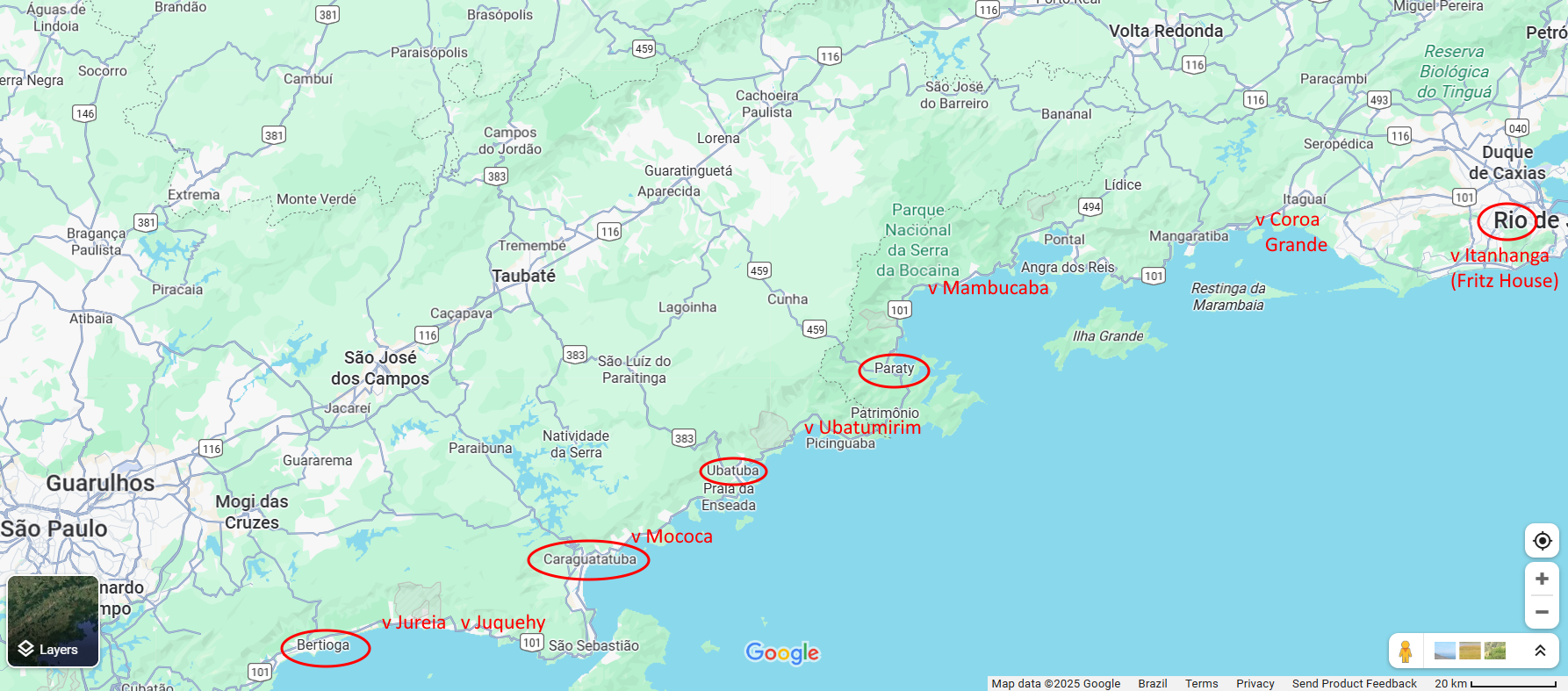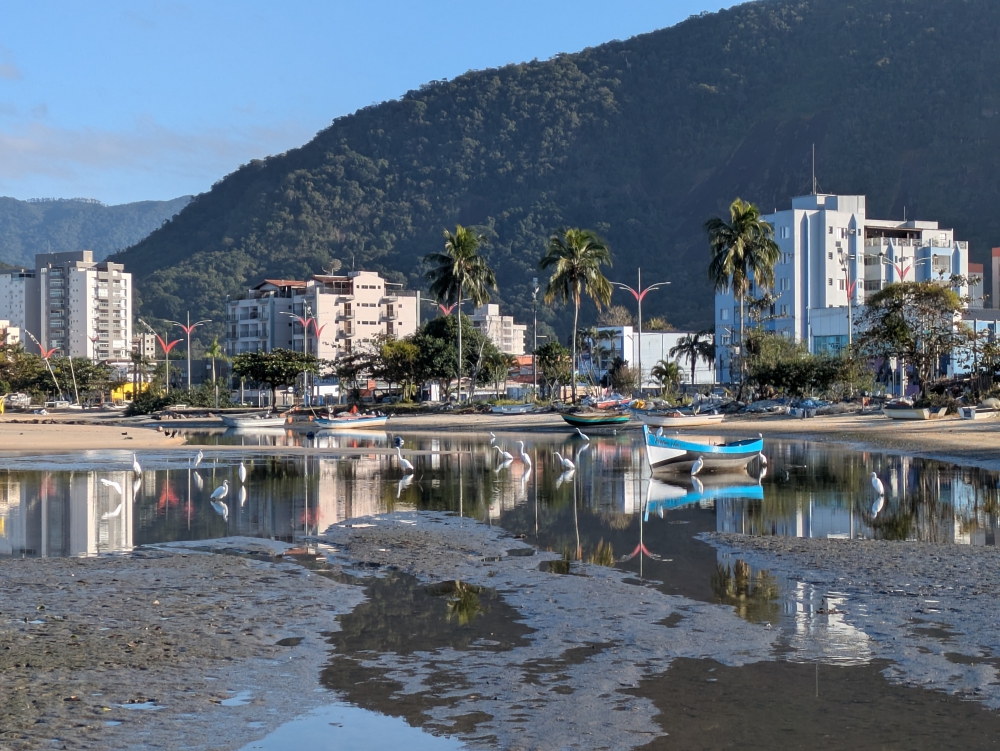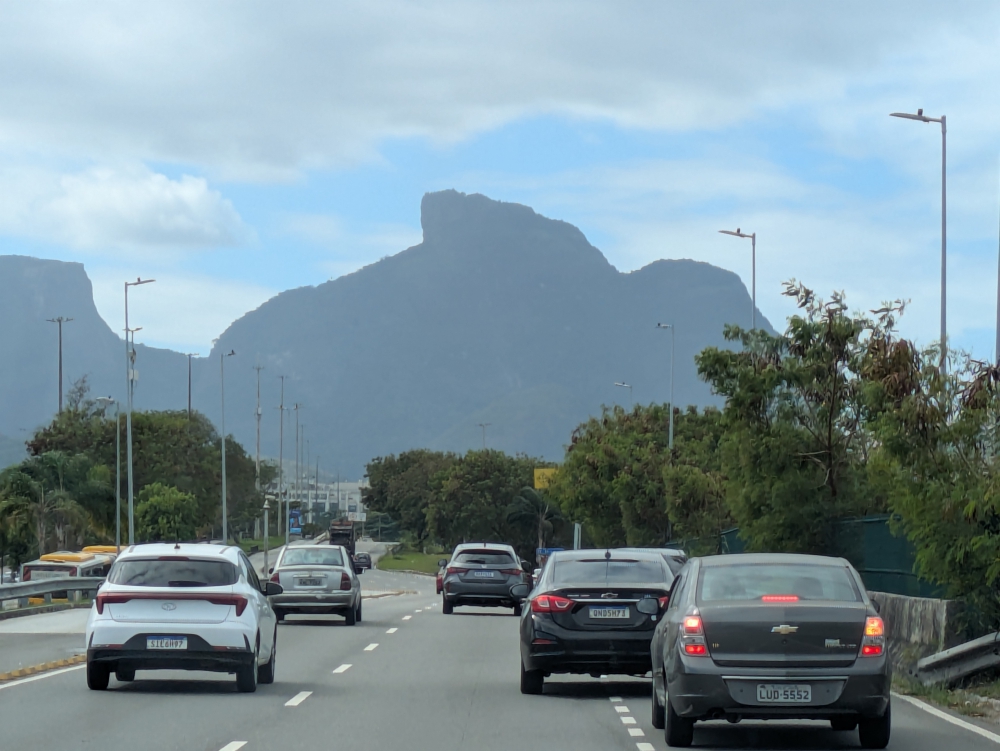
Our coastal route from Bertioga to Rio
Bertioga
On July 7th, 2025, Mark took a cab to São Paulo’s airport for his annual visit to Massachusetts, our official state of residence in the US. For almost three weeks, he visited doctors, family, and friends, while Maya and I stayed at the Jorai Campground in Bertioga.
(As always, click on or hover over photos in galleries to read their captions.)
My illusion of a three-week beach vacation—just my dog and me—quickly evaporated. The weather was chilly and rainy, the environment basic, I had to be extremely careful with our fresh water since Bertioga’s city water isn’t potable, ultralights took off multiple times a day creating frequent noise, and paid work arrived almost daily.
Still, I made the best of it and settled into a routine: morning exercises, laundry, shopping, cleaning, working, long beach walks with Maya, chatting with my fellow UK camper, hot showers, cooking and cleaning, nightly phone calls with Mark, and catching up on writing, Portuguese practice, and online interactions. I also prepped the camper and took photos for our upcoming “camper for sale” ad.
Mark eventually returned with a clean bill of health (yay!), and the three of us looked forward to driving north along the coast while checking out Brazil’s sights and beaches. A slower pace awaited—or so we thought.
Jureia Beach
Before leaving Bertioga, we washed the car. Near Jureia, we filled the tanks with fresh water and settled in at our favorite beach spot. We repaired a few things with parts Mark had brought back from the US and enjoyed slower days.
A storm soon swept through, toppling trees and wires across the pretty neighborhood, cutting off electricity and internet. Sometimes it’s good to be self-contained!
It remained damp and chilly—more condensation and salty air than rain—and by the end of July, we were ready to head further north in search of sunshine.
Caraguatatuba
Our plan was to stay a few days at several stops between Bertioga and Rio de Janeiro, depending on what we found.
Caraguatatuba promised quiet nights and good beach walks according to our free camping app iOverlander. But we’ve learned that “quiet” is relative. To me, it means “no sound.” To others, it ranges from “not very quiet” to “somewhat quiet.”
From the moment we left Bertioga, it became clear: the Brazilian coast—at least in the states of São Paulo and Rio de Janeiro—is packed and tough to explore in a big camper.

Reflections in the morning, Caraguatatuba
Everywhere was busy, especially on weekends. The roads were narrow and windy, full of speed bumps, overhanging trees and cables, with aggressive drivers. Parking was elusive. The skyline was dominated by high-rises.
Locals recommended spots like Juquehy Beach, Ilhabela Island, and Ubatuba, but conditions reminded us once again that traveling with a camper and a dog is very different from the typical tourist route.
We only spent one (noisy) night in Caraguatatuba. We initially enjoyed the hidden bay nearby, a beach walk with Maya, and the bustling fish vendors, but after not sleeping much, we moved on.
Mococa Beach
Another weekend arrived, and we desperately needed a quiet place to sit, work, and sleep. We found adequate Mococa Beach. Busy during the day, when the kiosks (beach shacks) overflowed with visitors, peace returned at sunset. The waves muffled the traffic noise from the main road.
Dogs were tolerated on the beach, especially early mornings and late afternoons, so we enjoyed exploring the coastline with Maya.
Ubatuba
In bustling, narrow Ubatuba, we found a place to refill our propane tank. Since that took most of the day, we killed time with a shopping spree, a walk along the boardwalk with Maya, and a quick stop at the Tropic of Capricorn.
Ubatumirim Beach
After one sleepless night at a noisy beach nearby, we moved to Ubatumirim Beach and finally found a slice of paradise.
We could camp right on the hard-packed sand, beach walks were easy and fun, a scenic bay lay just over the hill, and we met Larry, a fellow overlander from Australia.
The open sky gave us perfect Starlink coverage, tourists were scarce, and nights were quiet. But then I was offered a massive translation project I couldn’t refuse. It required constant computer power and internet. Being winter here, the sun was weak and low, often hidden by clouds. Our solar panels wouldn’t cut it.
We reluctantly left Ubatumirim for a proper campground where we could plug in. I gave my manager a deadline that allowed three travel days to Rio, where we knew of a suitable base. During those travel days, I worked just a few hours daily. Sadly, we had to leave paradise much sooner than hoped.
Paraty
Our schedule allowed only one day in historic Paraty, which quickly became my favorite Brazilian town. On the way, we stopped at a charming waterfall where Maya splashed happily—we could have lingered longer.
Paraty is best explored on foot. Driving on uneven cobblestones is another story, but we reached our campsite just in time.
Unbeknownst to us, part of the waterfront floods at high tide—apparently one of Paraty’s tourist quirks. Our friend Larry was stuck in his van until the seawater receded.
That first stroll into town was to buy bread for lunch, but it was hard to keep my phone in my pocket with all the photo opportunities.
After lunch, we wandered colorful streets, admiring the architecture and atmosphere. We also did a cachaça tasting and dropped by our friend Ana’s coffee shop/café, Alte Mare. We had met Ana in Ushuaia when she and her boyfriend, Alex, were traveling in their van; now she runs a cozy café in the cutest corner of Paraty.
In the evening, we followed Ana’s recommendation to eat at a fish restaurant. Larry joined us, and the three of us splurged with a relaxed dinner. Exploring with Larry always feels like vacation—he’s a generous, easygoing companion.
The next morning, our little family hiked to a fort for panoramic views. Afterwards, Mark and Larry joined a “free” walking tour while I worked. We had our first hot and sunny day. Migraine time!
Mambucaba
We left Paraty 24 hours after arriving and headed to Mambucaba Beach. I managed to work, but sleep escaped us that Friday night. A church event nearby was followed by a neighborhood party across the street from where we’d parked. The festivities lasted until 2 am. Just our luck.
Coroa Grande
The next day brought rain, hiding the coastal views and spoiling plans for a swim in the bay by the nuclear plant. We did stop at its museum, but with most signage only in Portuguese, it didn’t hold our interest.
When not driving, I worked, usually managing a walk with Maya wherever we were parked.
Coroa Grande was supposed to provide electricity at the town square, but we found no outlets. We moved on after another restless night filled with traffic noise, karaoke blaring until 4 am, and honking trains.
Itanhangá, Rio
On August 10th, we braved Rio’s chaotic traffic and impatient drivers, and squeezed in a few errands before reaching Fritz House, on the outskirts of the city. To our surprise, the camping area was limited to an uneven dirt patch by the driveway, and Starlink reception was blocked by trees. That was a first!

Approaching Rio de Janeiro
That afternoon, I dove head-first into my ten-day project while Mark tackled camper chores—cleaning the roof and solar panels with a low-pressure hose. Nothing is ever easy.
Fortunately, plugging into electricity wasn’t an issue, Fritz offers decent WiFi, the shower was hot, and Uber made Rio accessible—even with a dog.
For the next eleven days, we called Fritz House home: working, doing laundry and projects, meeting other travelers, and venturing into the city a couple of times. But Rio de Janeiro deserves its own story. That blog will come next month.
Next up: Our expense report for August 2025.
Curious about a previous ten-year chapter in our nomadic lives, which includes eight years aboard a 35-foot sailboat in the tropics with dogs, check out my compelling, inspiring, and refreshingly honest travel memoir:
Discover more from Roaming About
Subscribe to get the latest posts sent to your email.
















































































































































August 31, 2025 at 10:26 am
So much going on as usual. Hope the camper sale works!
September 1, 2025 at 3:41 pm
Thanks, Jacqui. Yeah, I don’t know how we can be so busy all the time. But then again, we are trying to combine a normal, working life with being on the road… Selling the camper will take a while, but we are prepared for that.
August 31, 2025 at 10:51 am
After selling your camper, what’s next, Liesbet, or are the two of you still figuring that out? I should know this, but you mentioned finding work frequently. Is your primary occupation as a freelance writer? I don’t mean to be nosy, just curious.
September 1, 2025 at 3:47 pm
Hi Pete,
Before we make any solid plans, we have to sell our camper in South America first. If for nothing else, we will need the money for our next set-up.
The hope is to take a little break between adventures, either with Mark’s family in the US or with mine in Belgium, before embarking on a European journey. But, this all depends on a few more factors, namely the health situation of my mother-in-law once we sell Thirsty Bella, how Maya is doing and if, where, and when we buy another home in wheels.
I’ve been a freelancer for about 20 years now, mainly as a translator, editor, and proofreader for Dutch and English. When we were sailing, I was a freelance writer, selling articles to sailing publications. I’d like to go back to the writing, but lack of energy, inspiration, time, and decent pay are keeping me from making the switch.
August 31, 2025 at 5:51 pm
Okay, I got excited when you mentioned you were practicing Portuguese, and then I realized that it is the language in Brazil. I thought it might be a hint that Portugal would be next. I’m sure Maya was good company during your alone time.
September 1, 2025 at 3:50 pm
Haha, Suzanne. I’d love to visit Portugal extensively, but right now, I’m learning Portuguese to communicate here in Brazil, because, honestly, it is very different from Spanish and no matter what everyone says about how similar both languages are… they are not. Especially the pronunciation.
We recently met a Brazilian tour guide in Rio, who listed all the countries in the world where Portuguese is the first language. Not only is this list extensive, but there are a few countries in there that I was baffled about. Like Angola.
August 31, 2025 at 7:50 pm
Wow, that was a lot of moving around despite the time you spent by yourself while Mark was in the US. Too bad you had to leave Ubatumirim Beach. I know how hard it has been for you to find a truly quiet camping site. I’m looking forward to your post about Rio de Janeiro!
September 1, 2025 at 3:52 pm
Hi Janis,
I had a few expectations about Brazil that I shouldn’t have had, like that it would be more of a first-world country, that the driving would be easier, and that the motorcycles wouldn’t backfire or have extremely loud mufflers. So, sleep is still not a given here. But, other beauty prevails.
Yeah, we have come to realize that we just can’t take it easy or slow. Something will happen, each time we decide to slow down. Even as I write this… But I’ll report on that later.
August 31, 2025 at 10:59 pm
I enjoyed this update and the photos that add so much. And it seems amazing to visit and sleep in so many different beautiful spots! Also, interesting how people define “quiet” different.
September 1, 2025 at 3:54 pm
Hi Yvette!
This is a great lifestyle to never get bored and have a different backyard whenever we want. We are seeing beautiful things, but by living this way, we also discover the more grimy and not so nice parts of each country.
August 31, 2025 at 11:17 pm
The Brazilian coast is beautiful and it was a very interesting travel description. Too bad it is is packed and tough to explore in a big camper. So you sold the camper? I wish I could see what you saw. It amazing that you are bringing your dog with you.
September 1, 2025 at 3:58 pm
Hi Thomas,
Maya is with us every step of the way and when she can’t visit a certain beach, we don’t go either. Our travels and means of travels revolve around her, as they have around all our previous dogs in the last two decades. But it does make life on the road a tad trickier, especially when national parks and dog-free areas are involved.
We didn’t sell our camper yet. We put it up for sale now as we expect it will take a few months to find the right couple or small family to undertake a similar journey in South America.
September 1, 2025 at 2:21 am
Well, we have been to and seem a lot of laundry rooms in campgrounds, but your photo of the Jorai Campground laundry has to take first place. Wow! Just Wow! But… the beach(s) looks wonderful! I really liked the photos of Ubatumirim Beach. Sorry to hear you were not able to stay there longer. Glad you took those photos of Paraty. Just beautiful. Can’t wait to hear about Rio de Janeiro. Thanks for sharing. Jim
September 1, 2025 at 4:02 pm
Hi Jim,
I’m glad you picked up on the condition of this particular laundry room. With my flipflops I had a hard time navigating the puddles and jumping out of the way when a machine emptied on the floor with a short hose, haha. And not twist my ankle or run into clothes already hanging to dry.
But the most interesting thing was that the washing machines are made out of plastic. And you manually open and close the water intake and outlet. It was a tricky endeavor. Also, the machine only washes. I had to rinse my clothes in a deep sink and then put it into the centrifuge machine, before it was ready to line dry. The whole process of washing my clothes and linen took about three hours. 🙂
I’m happy our friend shared his drone shots of the places we camped together, like Ubaturimim and Paraty. If we have enough time in Brazil, I’d like to return to both spots.
September 1, 2025 at 3:57 am
I have enjoyed this post and touring this part of my country with you. Apart from Paraty I have not visited many of these places. I can understand why it is busy around there, São Paulo being such a mega city. Did you feel safe at the places you stayed overnight? Sounds like you haven’t always stayed overnight in campgrounds? I am looking forward to your next post, about Rio. My son lived in Ipanema for 4 years, we loved visiting him. But he has moved on and now lives in Africa. Bom proveito nas praias do Rio 😀
September 1, 2025 at 4:06 pm
Hi Gilda,
Yes, we’ve always felt safe camping in Brazil – and the rest of South America. And, no, we don’t usually stay in campgrounds unless we need the power or for some other necessary benefit. We are completely self-contained and can go off-grid for 10-14 days. We always boondock (free camp), hence our low or non-existent camping/accommodation fees in my monthly expense posts. 🙂
I remember your son living in Rio and you visiting, but I forgot it was near Ipanema Beach. It’s nice to now be able to put a picture to that scene.
September 1, 2025 at 5:58 pm
I love all this. I love camping by the beach!
Paraty is my fave too. So cute. And I love that it floods – if you are prepared. Hopefully the flood won’t be getting any higher.
And I absolutely love the selfie with you and your dog! Maya!
September 2, 2025 at 8:16 am
Hi Duwan,
We had a serious storm on the coast in July and apparently the water came to the doorstep of our friend’s café in Paraty, something that doesn’t happen frequently but was scary.
I enjoy camping on the beach as well, but it hasn’t been as frequent as I hoped for in Brazil. We miss Baja and Mexico for that. Plus, the breeze has been onshore here, so camping near the ocean means a lot of salty spray, which isn’t ideal for our camper and car. Mark hates it. So we don’t stay long in those situations. Or not at all.
September 2, 2025 at 7:09 pm
I enjoyed reading your text, Liesbet, but unfortunately, none of the pictures came through for the first time. Have fun for the rest of your time in Brazil.
September 7, 2025 at 9:41 am
Hi Annie,
Thanks for reading. I’m sorry about the images. When I check my site, they load okay, so I’m not sure what the issue is. Could it be a weaker internet connection where you were? I know my blogs are heavy on photos (because I have a hard time picking favorites), but I resize them all and we changed web hosts to accommodate all this.
I do hope the issue doesn’t persist and that you can check back for the photos another day.
September 6, 2025 at 7:38 am
I’ve heard the Brazilian coast is busy, and you confirmed that, Liesbet. It must be one of the most populated areas of South America. But some of those beaches are beautiful and I’m glad some of them are dog friendly too at certain parts of the day.
Did those three weeks while Mark was away fly past? It sounds like you and Maya kept busy while he was away. There must be some excitement about what he’s going to bring back for you all.
I have to keep telling myself that it’s winter while reading these posts. I always imaged Brazil as a sunny and warm/hot country. And it’s the largest of all the countries you are visiting, so I’m wondering of you’ll et the chance to visit all parts of it. before Thirsty Bella is finally sold.
September 7, 2025 at 9:53 am
Hello Hugh,
You pose some very interesting and good questions and I happily address them as the answers affect our current situation greatly…
The three weeks Mark was gone flew by like crazy, because I was super busy – with the usual stuff, but with the added work assignments even more so, which kept me from relaxing or having a bit of vacation and me-time while he was gone. I usually look forward to his annual departure, but now, he was back before I realized he was gone. 🙂
The only anticipation for him bringing back “goodies” is when they involve fixing issues we had in the camper, like a leaky faucet in this case. I lost a lot of potable water and had daily cleanups until he returned with the new kitchen faucet and installed it. He did bring back some Belgian chocolate and other gifts, which was nice and unexpected.
We were a bit surprised about the cold and rainy weather during the winter here in Brazil as well. I guess I had the same conjured up images as you. I also thought there would be plenty of remote beaches where we could camp. I was wrong on both accounts, but more about that later. Spring is around the corner now and the weather is improving.
Now here’s the current situation: Yes, Brazil is huge. As a matter of fact it is too big for us to drive and explore in depth, like we had hoped to do. It’s also a stressful country regarding roads, drivers, and obstacles.
On top of this, I just found out I couldn’t get a three-month extension in Brazil, because Belgium is part of Schengen and there is reciprocity about this. So, unfortunately, we are not staying in Brazil until the camper sells – as we’d expected to do – but, as I write this, we are driving 1,000 miles to leave the country before my initial three months are up…
September 8, 2025 at 10:54 am
Oh, no! What a shame you have to leave Brazil so quickly. But given what you said about it being a stressful country on the road front, it’s probably a good idea. As we all know, stress gets nobody anywhere.
Good to hear about the Belgian chocolate. I can’t wait to get my Belgian chocolate Advent Calendar. They are already available, and I’m tempted to get one for October and November, too 😋
September 14, 2025 at 1:03 pm
Hi Hugh,
I had no idea about Belgian chocolate advent calendars. I guess it does make sense to have them with goodies like these.
We are back in Paraguay now, after loads of driving. The next thing to chase us off will be the crazy hot and humid weather, probably. Temperatures in the low nineties are already predicted for next week. There is always stress about something in this lifestyle. That’s why we are ready for first-world countries again. At least for a little while.
September 7, 2025 at 8:28 pm
Hooray for Mark’s clean bill of health! The rest of it sounds like a giant hassle – I think that, of all the difficulties you’ve encountered during your South American adventure, the constant noise must be the most wearing. You must be in a more or less constant state of exhaustion.
Fingers crossed for your sale of the camper!
September 14, 2025 at 12:59 pm
Thanks, Diane. We are certainly ready for the next chapter, whenever our camper sells. Until then, no solid plans can be made. And, yes, not being able to sleep at night – whether this is due to the weather, the noise, our dog, or other factors (and there always seems to be at least one) – is extremely exhausting and frustrating. Now that we have more power again – the days are getting longer down here – we can run our fan at night to make background noise.
Other factors we are worn out by are the bad roads, aggressive drivers, biting bugs, uncooperative weather, and litter everywhere all the time. I’m sure I’m forgetting a few things here. 🙂